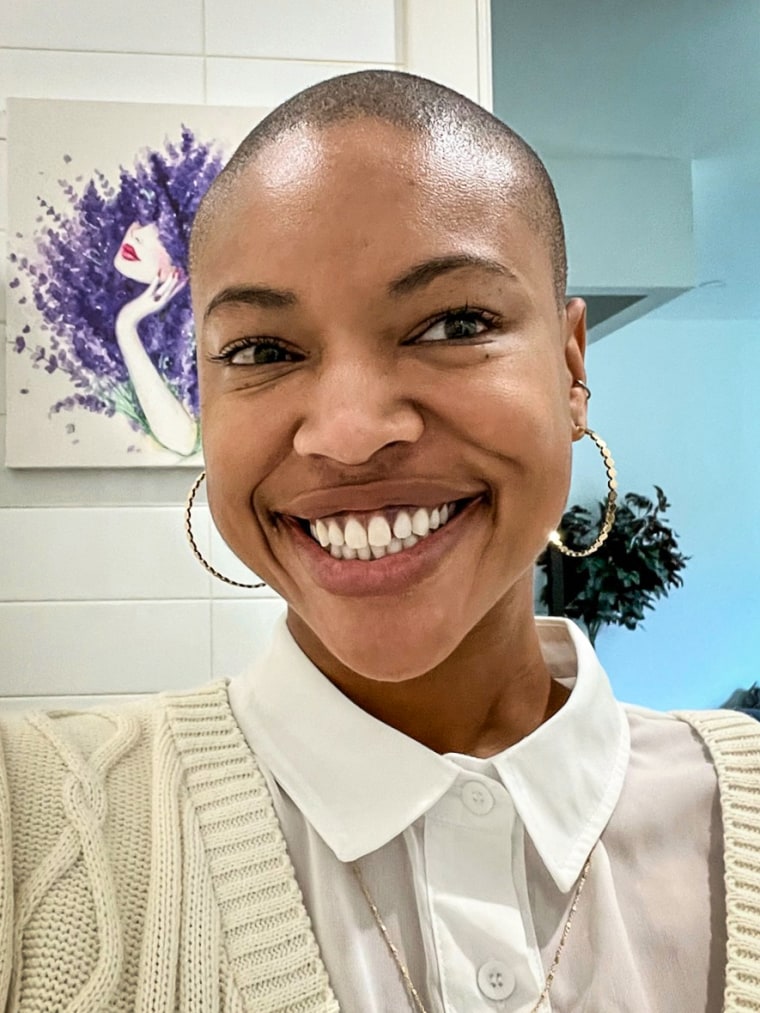By now, you've probably watched and seen all of the Twitter talk around what happened onstage at the Oscars between Will Smith and Chris Rock.
To quickly recap the most talked-about moment, Rock was presenting the Oscar for best documentary feature and made an insensitive joke (as comedians do) about Jada Pinkett Smith's lack of hair. "Jada, I love you. ‘G.I. Jane 2,’ can't wait to see it." Pinkett Smith shaved her head recently because she has alopecia, a health condition that has no cure and causes hair loss, which she's been very transparent about.
Several things about the incident can be true at the same time: Violence is not OK. Comedians make jokes. What Rock said was hurtful.
Initially, Smith was laughing at the joke, but after seeing his wife's reaction — anyone watching could see that Pinkett Smith was humiliated and annoyed by the statement — he proceeded to walk on stage and slap Rock across the face before going back to his seat. Once seated, Smith yelled at Rock, to keep his wife’s name out of his mouth.
He may have acted on the fact that Rock's inconsiderate comment could take away from all of the growth and progress his wife has made on accepting her bald natural hair — let alone at one of the most glamorous, photographed events in the world. Several things about the incident can be true at the same time: Violence is not OK. Comedians make jokes. What Rock said was hurtful.
However you feel about Smith's reaction to Rock — and there are many who seem to be split on it — this incident points to a concerning and larger issue that Black women continue to face around their natural hair not being good enough and being made to feel ashamed of wearing it proudly.

While watching the Oscars, I had the same reaction as Pinkett Smith. As a Black woman who willingly shaved my head 11 years ago, I can absolutely relate. I don't have alopecia, but I've dealt with the same humiliation that Pinkett Smith and a lot of other Black women experience by wearing our hair in its natural state. Not nearly on such a public stage, but the underlying context remains the same: Black hair is not beautiful or socially acceptable.
When I first shaved my head, many people, including Black women, didn't understand why I would do such a thing and automatically warned me that men would not find the bold move attractive. When I was insulted, the first thing people would go after was the fact that I didn't have hair. I was made to feel less than because I was bald. I've also been called my fair share of insults, including "baldheaded," "no edges" and "Caillou" (in reference to the bald main character of the popular kids television show).
Like Pinkett Smith, many women of color experience alopecia. According to a 2016 survey of 5,594 Black women, 47.6 percent of respondents said they experienced hair loss. Since revealing her diagnosis in 2018, Pinkett Smith has not shied away from, and has spoken publicly about, the condition. In an episode of her talk show, she recalled the "terrifying" moment she first noticed she was losing "handfuls of hair" in the shower.
"It was one of those times in my life where I was literally shaking with fear," she said. "That's why I cut my hair and continued to cut it."
Any woman can tell you that shaving your hair off is both thrilling and empowering. Personally, it has given me a long-awaited freedom: I no longer fit into the box — constructed by fragile men and racist opinions stemming from European standards of beauty — of how I should be wearing my hair.
Hair has long been tied to the worth of a woman, but Black women have grown up spending a fortune on hair care products to avoid "short nappy hair."
Racism and patriarchy have taught Black women and ultimately made them believe that their natural beauty was ugly, undesired and needed to be changed to fit in culturally. Hair has long been tied to the worth of a woman, but Black women have grown up spending a fortune on hair care products to avoid "short nappy hair." Rock's words are feeding into this harmful rhetoric around Black women's hair. They’re breathing new life into the disrespectful way our hair has been politicized and ridiculed for centuries.
Pinkett Smith showing up bald every day, no longer hiding behind wigs and weaves, lets others know it is OK to step out in your authentic bald self. This is something that should be celebrated, not made fun of. She is showing us that you can still be confident, fabulous and beautiful and live your best life while bald.
Since the encounter, there has been a lot of talk about the need to protect Black women. Some argue that Smith was protecting his wife, but Rock, in a room full of his peers, could've decided to not tell a distasteful joke about a Black woman. That is also a form of protecting Black women, especially since our hair and how we choose to wear it has been the butt of jokes for generations.
What's so confusing about all this is that Rock produced an entire documentary about the cultural importance of Black hair rituals, "Good Hair," which he said he made for his daughters, and then he went on to tell a joke aimed at a Black woman's hairstyle.
Seeing the solidarity around Pinkett Smith's condition and hair choice is uplifting. I'm hopeful that this incident will only continue to open up the much-needed dialogue around a Black woman with no hair.
Related:
